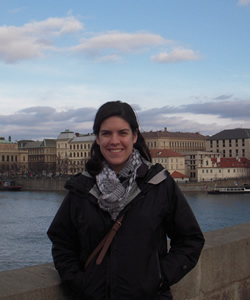
Caroline Holkeboer on Communism and the Development of a Culture
April 14, 2011
After living in Prague for almost three and a half months now, I have come to understand the meaning of living in a post-communist world. Prague is certainly a city that has experienced much political turmoil over the course of the last century—first under Nazi occupation as a result of the 1938 Munich Agreement, followed by decades of communist rule until the Velvet Revolution in 1989.
While the demise of communism in Central and Eastern Europe happened over 21 years ago, the marks of an oppressive and totalitarian regime can still be seen in those cultures previously under communist rule. The Czech Republic is no exception. The post-communist culture that has emerged both retains and visibly reflects a previously enforced collective identity, where members of the society were both expected and forced to live under a mass-driven system. Today, the remnants of communism are increasingly apparent as both a government and a people come to terms with their identity in the wake of a totalitarian regime and subsequent developing democracy.
These cultural attributes are striking. First of all, on the trams and in the metro, there is a general sense of reservation and any sort of commotion or chatter solicits concerned glances from passengers. Traveling to and from class our first few weeks here, we attracted lots of attention as we tried to acclimate ourselves to a culture, in many ways unlike our own. Furthermore, there seems to be a general apprehension towards authority and governmental officials. During my first week here, we had to register with the Foreign Police as to the nature of our extended stay here in Prague. During the visit, our program advisers expressed an underlying apprehension towards the conduct of the Foreign Police, which only heightened the uncertainty of the experience due to the fact that none of us spoke a work of Czech. As an outsider, these cultural mentalities have been both surprising and eye-opening, revealing the extent to which communism has affected an entire people.
In addition to my own observations, these cultural remnants of communism are something that the Czech people are not only aware of, but often poke fun at themselves. In my Czech language class, many of our assignments have revolved around Typický Český, or those stereotypes that generally describe Czech people. In fact, my Czech teacher, Petra, is often the first one to point out the oddities and idiosyncrasies of the Czech culture.
These are only small examples, but these observations reflect a larger cultural identity that has emerged in the aftermath of a repressive regime. While these Typický Český characteristics may seem overly simplistic and at best a surface level perspective on an otherwise intricate culture, they are in fact a reflection of many years of hardship and oppression for the Czech people.
My experience with Czech culture here in Prague has lead me to wonder how long it takes for the mentality of a regime to cease its influence upon a culture. The older generations in Prague, who personally suffered under the communist regime, certainly are the most reserved and skeptical of the government—my 70 year old professor scoffs at “the corrupt police officers” every time a police car passes by us. But, these cultural attitudes have also been translated down to the younger generations, even those born after the fall of the Berlin Wall. In fact, most of today’s university students in Prague were born after the end of communism, yet their lives appear so much different then my own, in part because of what communism instilled in their parents and in turn on their own upbringing.
It may take two or even three more generations before the memory of communism is removed from the psyche of the Czech culture, but is an important question as to the nature and lasting effects of a totalitarian regime. Communism is certainly an important part of their past and it will be interesting to observe how the Czech people continue to move forward with the memory of communism in the future.
About the Author
Opens in a new window
